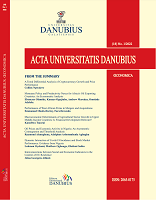An Assessment of the Impact of Public Debts on Development in Nigeria (2003-2020)
An Assessment of the Impact of Public Debts on Development in Nigeria (2003-2020)
Author(s): Betty Oluwayemisi Alli-Momoh, Fatima Jummai Akinsanmi, Rotimi Oladele, Olabisi AlabiSubject(s): National Economy, Economic history, Economic development, Transformation Period (1990 - 2010), Present Times (2010 - today)
Published by: Editura Universitară Danubius
Keywords: Public debt; Per capital income; Human Development Index; Growth rate; Development;
Summary/Abstract: This study assessed the impact of public debt on development of Nigeria. It specifically investigated the relationship between human development index, per capital income, growth rate and public debt in Nigeria from 2003 to 2020. This study adopted quantitative research design. Relevant data regarding the variable’s under-study were extracted from the Debt Management Office (DMO-2020) and UNESCO Institute of Statistics (2020) while regression model was used to analyze the data. The study revealed among other things that; there is presence of co-integration (long-run relationship) among the variables in the model. The t-statistics of -2.297997with 0.0388p-value implies negative and significant relationship exists between foreign debt and human development index, t-statistics of 2.557340with 0.0239p-values implies positive and significant relationship exists between foreign debt and per capital income and also t-statistics of -0.658730with p-value of 0.5216implies negative and insignificant relationship existence between foreign debt and growth rate. The overall result of the f-statistics of 4.109504with Prob.(F-statistic) of0.029617shows that all the explanatory variables jointly have significant impact on foreign debt both in the short and long run. The study concluded that there is significant relationship between public debt and development in Nigeria, depending on the variable of interest. Likewise, the study recommended among other things that government should ensure efficiency and effectiveness in the public debt management due to the negative and significant influence of human development index on development both in the long run and short run, also the negative and insignificant influence of foreign debt on development in Nigeria which is a pure indication of poor public debt management in the country. Also, the component governments in Nigeria should reduce it public borrowing as it has a significant inverse effect on the development of the country in the long run.
Journal: Acta Universitatis Danubius. Œconomica
- Issue Year: 18/2022
- Issue No: 3
- Page Range: 213-233
- Page Count: 21
- Language: English

